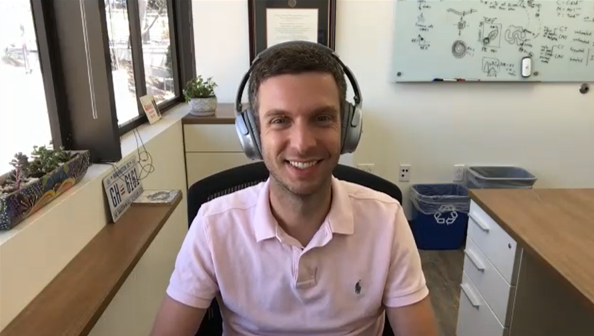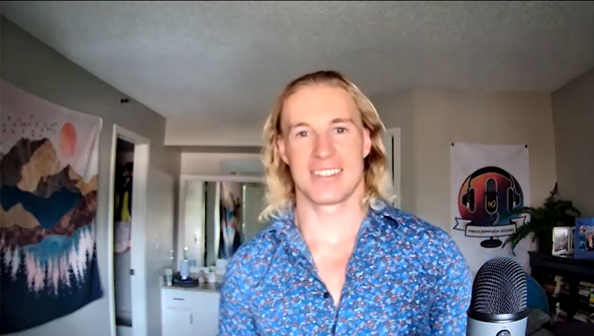

Immunologist Michael Constantinides, PhD, examines the symbiosis between our body and the bacteria that inhabit us. Here, Michael discusses his path toward studying neonatal infections and the specialized immune cells that may protect us during these most vulnerable stages of life.
Where did you get your scientific mind?
Growing up in Chicago, my parents could tell I was inquisitive and really encouraged that from an early age. I loved to play with LEGO®, but then that transitioned to taking things apart around the house. I would disassemble a television remote or a broken phone, just to know how things worked. Rather than discouraging that, my parents decided to channel that in a more constructive direction. They bought me a chemistry set and by the time I got to high school, I joined the science team and started competing in national contests. It was exciting working with my teammates in this collaborative setting and it made me think that this was something I might want to pursue long term.
When did chemistry turn into a love of microbes?
By my senior year of college, I hadn’t taken many biology classes. Sitting in on one, I realized it was more interesting than I remembered. Although I loved the idea of basic research, I also wanted to have a positive impact on human health. So, I worked as a research technician for two years in an immunology lab at the University of Chicago. From the mentorship I received during this experience, I knew that this was the lab I wanted to join for my PhD. Graduate school seminars and discussions on the benefits of commensal (non-harmful) microbes encouraged me to pursue a postdoctoral fellowship studying the microbiome at the National Institutes of Health. Ironically, my mother warned me of the harmful effects of microbes, so I was quite wary of them as a child. While there are numerous pathogens out there, research on the microbiome has established that not all microbes are harmful. In fact, our immune system and the body in general need a number of these different species to develop and thrive.
How do bacteria help shape health early in life?
When a baby is born, they are exposed to both commensal and pathogenic bacteria. Since our adaptive immune system takes weeks to develop, what protects the infant initially is our innate immune system and specialized innate lymphocytes. It seems like these cells play a major role in early-life immunity and help determine which microbes colonize our barrier surfaces, such as our skin. And it’s really important to make sure our bodies are colonized with the right kinds of bacteria. If we are colonized by opportunistic pathogens, that could lead to abnormalities in the microbiome and predispose us to infections down the road. You see similar effects sometimes in the GI tract when people take a course of antibiotics. The treatment may clear out much of the beneficial bacteria that usually occupy the niche, enabling other problematic microbes to thrive.
Is the microbiome affected by the conditions of birth?
The method of delivery will differentially influence which bacteria will initially colonize the child. During a vaginal delivery, the infant is exposed to Lactobacillus bacteria, which are beneficial for the immune system and tend to limit inflammation. However, during a C-section, the baby comes through the skin, where different Staphylococcus species are present, including opportunistic pathogens such as S. aureus.
How severe are these neonatal infections?
Barrier surfaces are very fragile in newborns since all the junctions between cells aren’t yet properly stabilized, so there is a much greater chance of bacteria infiltrating the skin. Sepsis is the third most frequent cause of neonatal death, sadly killing around 400,000 infants each year. A problem is that for the bacteria responsible, we don’t have effective vaccines, so we can’t give the mother a shot in advance of birth. Many of these species are also resistant to different antibiotics, so it often makes treatment very difficult. My lab is studying innate lymphoid cells to create immunotherapies that could protect against these early-life infections. I’m also interested in new compounds that could block the synthesis of essential molecules that are necessary for a bacteria’s survival. These multi-step pathways would be difficult for microbes to adapt, so I think this could be an effective approach outside of traditional antibiotics.
What are some of your passions outside of the lab?
With a Cypriot father and a Greek mother, my family was always near water, so I’m passionate about watersports. We used to visit Cyprus or Greece every summer when I was growing up and that’s where I learned how to dive, at the age of 14. Since then, I’ve had the opportunity to dive at the Great Barrier Reef in Australia, as well as Indonesia, Belize, Mexico and a number of Caribbean islands. Now that I’m in San Diego, I would love to explore the Torrey Pines marine reserve. Beyond diving, I was also on the sailing team in college and I loved fishing as a child. Surfing will be my next challenge!